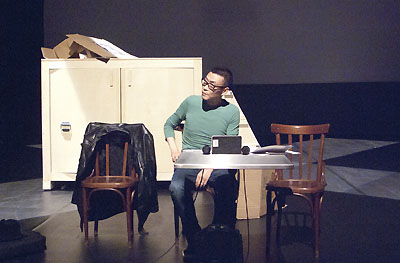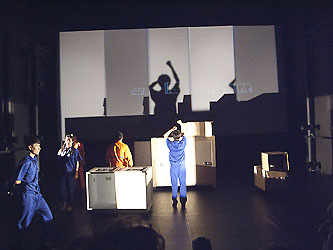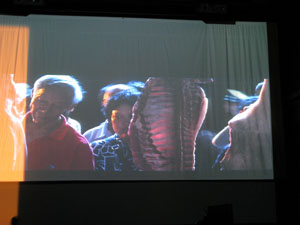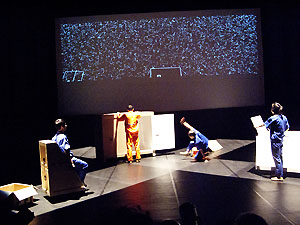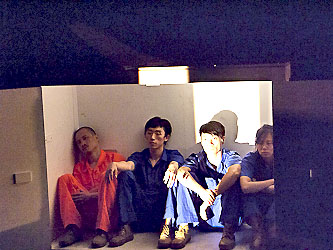|
|
|
Welcome to the Desert of the Real
How
does an artist translate, represent and communicate the loss
of identity in a society that is no longer stable? Wang
Jianwei undertakes the challenge in Welcome to the Desert
of the Real, a play that constantly oscillates between performance,
videos and theater. In Symptom, the artist tries to understand China’s contradictions. “It is no longer the way it was in ancient China,” the artist told us during the rehearsal of his play at the Théâtre du Grütli in Geneva. “In ancient China, everything was very simple. Everything worked in a linear way. From one end of the line to the other, there was a common goal.” Today, the reality is less tangible. The artist takes his inspiration from uncertainty. The relationship that we have to people and to events is completely different now. The artist feels the need for a new approach in order to understand Chinese society, its culture and its problems. For him, the search for a method, for a way of representation, cannot be treated as a strict dichotomy: black versus white; pro versus con.
Welcome to the Desert of the Real was
presented in Basel, Zürich
and Geneva as part of a vast program on China offered this
year in Switzerland by the cultural organization Culturescapes
(www.culturescapes.ch).
The Théâtre du Grütli hosted Wang Jianwei’s
work for La Bâtie Festival de Genève this
September 2010.
Welcome to the Desert of the Real is
based on a short news story published in a Chinese magazine
about a 16-year old
boy, who
strangled his mother.
Meanwhile,
five actors emerge silently from wooden boxes. A hand appears
here, five fingers there, a head
and then
a foot,
a bottom
pushing the top of a box while a leg stretches, lifting
the side of another box. The body parts emerge and
appear in
our visual
field like icons on a video game. And you are lost
because you do not know which one is important, if
there is any
logical sequence
or not, if the game won’t virtually explode
in your hands. When the actors-dancers have reconstructed
their
body, they
move, as if they were running amok. Chopped and contorted
gestures, walking jerkily with no specific direction
as lost in the meanders
of the streets and ultimately of their mind. Hope
may
be there when they walk toward each other. But, at
the last
instant
of
an eventual meeting of eyes, they turn around and
continue their walk like puppets from which a cord
would have
been cut.
Beijing
hosted the world première of Welcome to the
Desert of the Real. Wang Jianwei was positively surprised
by the audience’s
reaction. Spectators connected the play with the recent dramatic
events that occurred at the technology giant Foxconn, a Taiwanese
company, which employs 900,000 workers all over China. Thirteen
young workers attempted or committed suicide between January
and May 2010. “ These are people who spend their day by
drilling holes in circuit boards and who have no relationship
with the person working next to them,” notes Wang Jianwei. “In
the dormitories, the person who is going to work is replaced
by someone else who immediately occupies the bed. These workers
never have a chance to talk with another person. Every day, they
lose more and more of their critical sense regarding life.” It
is a very high price to pay for China’s
development and for the gadgetization of the
West -- Foxconn
assembles our
iPods, iPads, iPhones, Dell computers and Apple
computers. (see the
blog below by a worker at Foxconn).
The
short news story, which provides the core theme of the play,
is symptomatic of all contemporary
societies. Communication,
space and time not only compete in the world
of
globalization, but they also demand that we
develop a new model
for reflection
outside of the “reality” used by states to promote
their own development models. Wang Jianwei believes this is the
duty of an artist, to ask questions even though they are complex.
Some spectators at the Théâtre du Grütli complained
that the play was too cerebral, too abstract to be within everyone’s
reach. They accused Wang Jianwei of being an elitist. These legitimate
concerns are central to an artist’s integrity
and involvement. A worker's blog published on China Digital Times (September 15, 2010) To die is the only way to testify that we ever lived Perhaps for the Foxconn employees and employees like us We, who are called nongmingong, rural migrant workers, in China, The use of death is simply that we were ever alive at all, And that while we lived, we had only despair.
More information on Desert of the Real and Wang Jianwei is available at http://www.wangjianwei.com |
||||||||||||
All material copyright 2010 by 3 dots water

